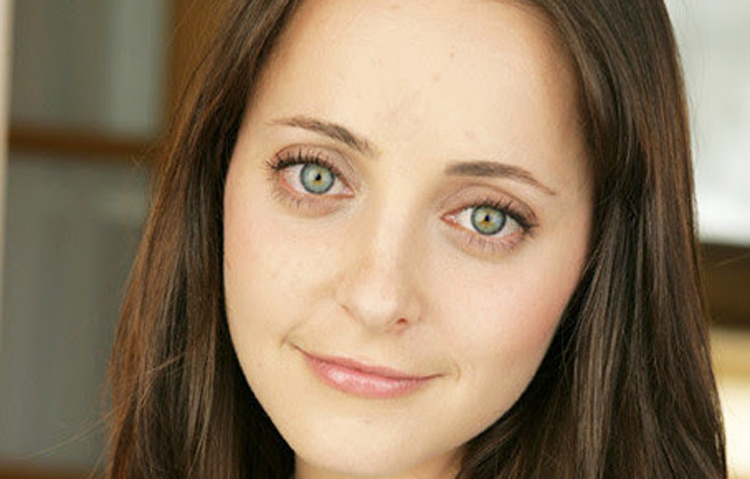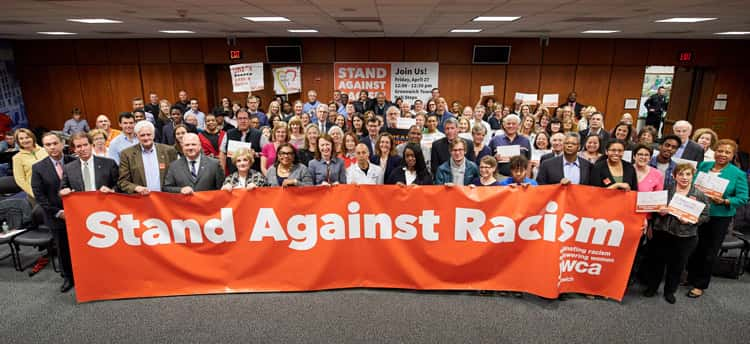
By Rob Katz

Visiting Rabbi Jordie Gerson at her office in the Greenwich Reform Synagogue (GRS) in Cos Cob, it doesn’t come as a surprise that our interview has been slotted into weeks of back-to-back meetings for the rabbi, who was appointed to lead the GRS congregation on July 10.
“Tonight we have our first board meeting,” Gerson notes as we settle into her office, its shelves already brimming with texts, “so things are a little insane around here at the moment.”
And immediately after our interview, a family interested in joining Gerson’s congregation will be at her door in the new synagogue, whose finishing touches were done in May.
Fortunately, between congregant meetings among other appointments, we have some time to discuss her career and what brought her to Greenwich. We also have a moment for a tour of the chamber in which she hopes to spend countless Shabbat and holiday sermons with her congregation.
A door at the side of Gerson’s office leads to what she calls a “smart sanctuary.” It’s clean and sleek, with several rows of eggshell-white plastic chairs wrapping around the understated, filigreed doors of the ark of the Torah. The door panels are finished with metal leaves, presumably in reference to Proverbs’ description of the Torah as the “tree of life.”
“We have the capacity for visual tefillah,” Gerson says, using a Hebrew word for “prayer” and pointing to two projectors built into the wall facing the ark. “We have two movie projectors back in there, so we can project the prayers on the other side of the room.”
A black grand piano, the visual foil for the rest of the sanctuary’s cool beiges and whites, flanks the ark.
“That’s a real piano,” Gerson says, not a digital one. “We have to kick some things old school.”
Before we head back into the rabbi’s office, in one of the corners of the room, Gerson points out a series of tall white panels that pull back to reveal stacks of prayer books, or Siddurs. It’s yet another modern touch in a building that, according to Gerson, has been designed “as a gift to the present and the future.”
Gerson is the daughter of a retired reform rabbi, Gary Gerson, who served the congregation of Oak Park Temple B’nai Abraham Zion for thirty years in Oak Park, Ill. (which Gerson mentions is also the home of iconic American architect Frank Lloyd Wright). The senior Rabbi Gerson, now the rabbi emeritus at his temple, still teaches courses there.
Her mother, Dr. Carol Gerson, a retired pediatric ear, nose and throat surgeon, now works as a mohel.
“Do you know what a mohel is?” Gerson asks me, as she makes a gesture of two scissor blades snipping with her fingers. “Ritual circumciser.”
Gerson received an undergraduate degree at Bates College in Maine, double majoring in English and Religion, with a focus on Buddhism, and expecting to become a writer after her graduation.
“I wrote a novel, the worst novel you’ve ever read, for my senior thesis,” she says, evidently summing up her novelist career, at least for the moment.
Once out of college, Gerson became a reporter for the Enterprise in Brockton, Mass., where she covered two suburbs of Boston.
Afterward she moved to the mining town of Alder, Colo., for two years, where she lived in a log cabin, teaching rock-climbing to at-risk girls among other part-time jobs.
“I went to Bates, so everybody did things like that,” Gerson says. “It’s a very crunchy school. Everybody moves to Colorado or Alaska for a few years. All of our friends were working on organic farms or being ski bums.”
Gerson then attended Harvard Divinity School for two years and received her master’s degree in Christianity and Islam, intending to become a dean of religious and spiritual life or a professor of religious studies.
“I was the daughter of a rabbi, so I felt like I had the Judaism base covered,” Gerson explains. Her focus at the time was on being able to engage with a wide swath of students of various faiths. “I was trying to get grounded a little bit in all of these traditions.”
Meanwhile, Gerson spent the summer between her two years of her master’s program at Massachusetts General Hospital, training for hospital chaplaincy and working on the transplant unit, providing terminal patients with pastoral care.
“It was such a moving experience, and such moving and meaningful work, that I decided to apply to rabbinical school, which I had not thought I would do,” Gerson says.
She applied to Hebrew Union College, a reform movement school in New York City, where she studied at its rabbinical school for four years, spending two years as a rabbinic intern for the New York University (NYU) chapter of Hillel, an international Jewish campus network.
Gerson also freelanced for online Jewish publications such as the “hipster Jewish website” Jewcy. As well, she spoke “fairly regularly” on panels for the Harvard Divinity School and wrote for the school’s magazine, the Harvard Divinity Bulletin.
After her four years of rabbinical schooling, however, Gerson was faced with finding a job in the midst of the Great Recession.
“I was ordained into the worst job market for rabbis since the Depression,” Gerson says. “It was 2009. Nobody was retiring.”
So in 2010 she became a Hillel rabbi at Yale University. After a few years, she served as a rabbi at the University of Vermont for one year, followed by a non-campus congregation in Montreal.
“I loved [being a campus rabbi], but I felt like I was aging out of it,” Gerson says. “There’s a very specific demographic that you’re serving, and developmentally it’s a very narrow window so I was having a lot of the same conversations over and over. I loved my students.”
She points to a photo in a silver frame on the windowsill, alongside various certificates, of her and a few people around college age.
“That was my first congregation at NYU, and they gave that to me when I left,” she says. “I’m in touch with a lot of my students because of Facebook. I’m officiating a lot of their weddings, I’m writing recommendations for them for graduate schools.”
However, Gerson realized that she wanted to have her own position in her own community, leading her to take on the open rabbi position for GRS.
“They’ve done an extraordinary thing here,” Gerson says. “Jewish life is not on the decline, but the faith they have in this community to grow and flourish and really change the face of Judaism in Greenwich and become a center for Jewish life not just in Greenwich but in Fairfield County is tremendous. I feel hugely honored to have been hired to help lead that.”
The Jewish community in Greenwich, she notes, deeply benefits from its proximity to New York.
“New York City is the beating heart of American Judaism right now,” Gerson says. “Creatively, intellectually, spiritually, we have all of those resources at our fingertips. The thinkers, the public intellectuals, the artists, we can bring them all up here to learn from them.”
However, Gerson finds that one of GRS’s best draws for her was the open-mindedness with which they searched for their new rabbi, particularly in regard to gender identity.
“This was the only place where I interviewed that didn’t bring up my gender or say, ‘Well, what’s it like being a female rabbi?’” Gerson notes. “I was so moved by that. I grew up with [feminist publication] ‘Ms.’ Magazine, and [record album and book] ‘Free To Be… You and Me,’ and second-wave feminism—my mom was a huge second-wave feminist.
“When I said to them, you didn’t say a single word about me being a woman rabbi, their response was, ‘It doesn’t matter, you’re the best person for the job.’ That’s a rare and beautiful thing,” Gerson continues. “I found that really telling, not just about who my congregants are, but how forward-looking they are, how forward-thinking they are and how open they are.”




